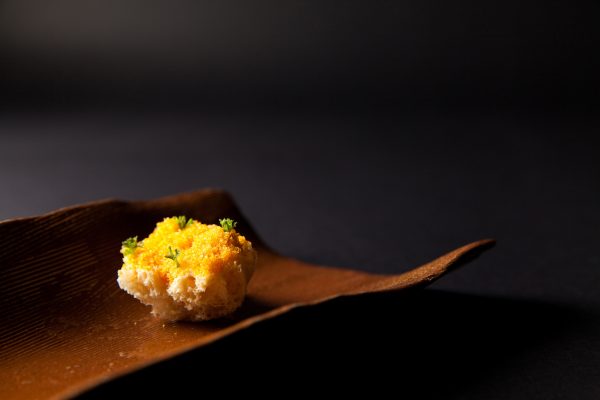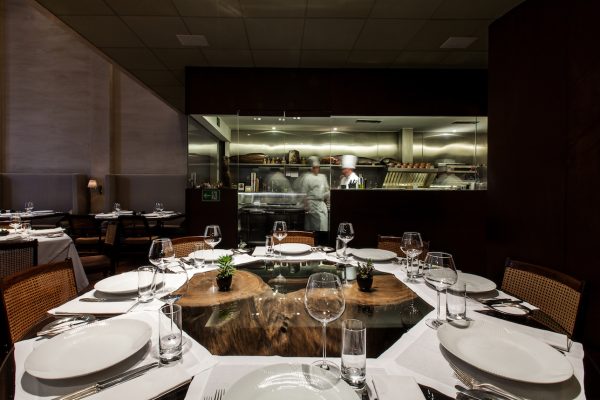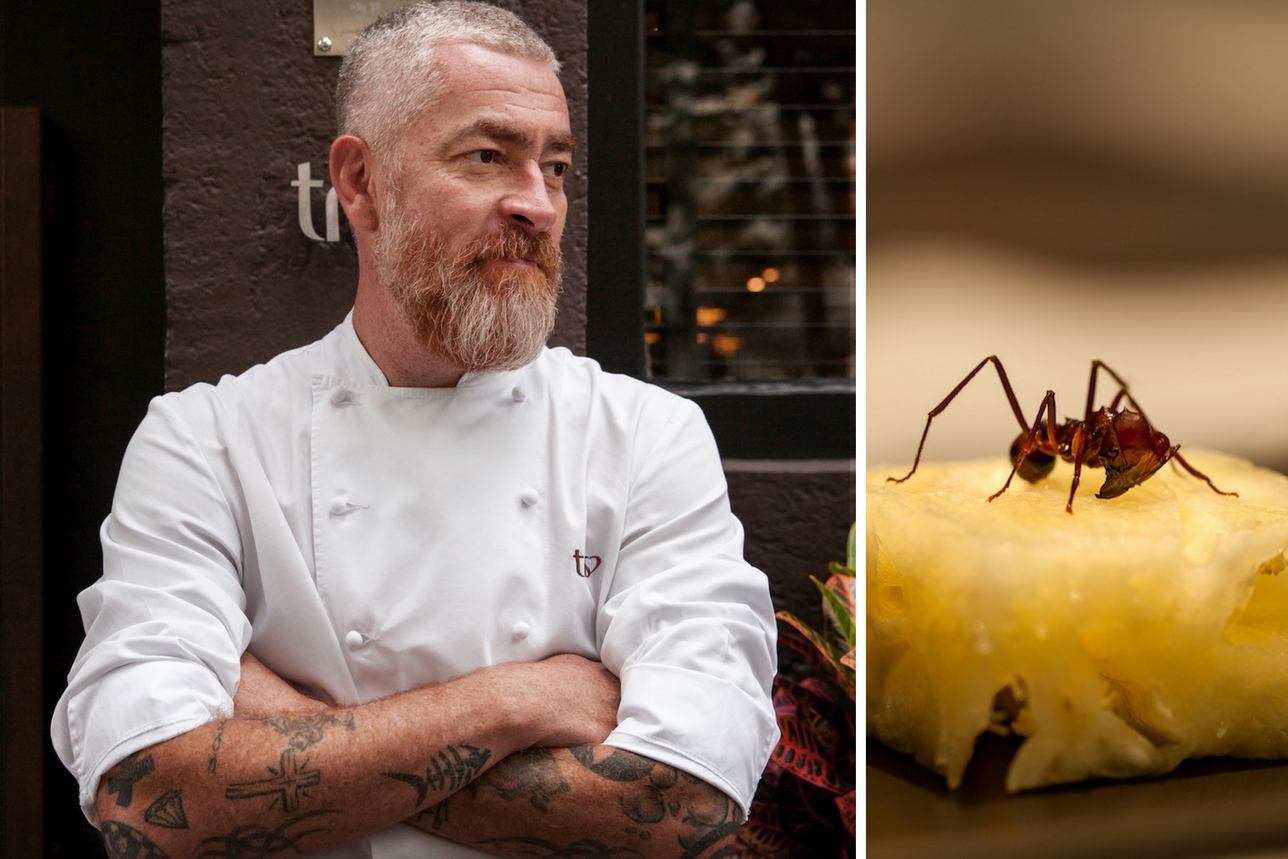Brazilian, 48 years old, founder of D.O.M, a «restaurant with local roots». Today we interview Alex Atala.
His immersion in the kitchen was by chance. Alex Atala (Mooca, Sao Paulo, 1968) went to conquer Europe when he was only 17, where he had to perform different jobs as for example being a painter. Later and due to the imminent expiration of his visa, he joined a cooking school and in this exact moment, he discovered that pots and pans are his passion.
His restaurant D.O.M (Sao Paulo, Brazil) means «God is optimal and maximum». This is an acronym derived from «Deo Optimo Maximo». Its gastronomic level is such that it positions the restaurant in the 11th place in the list of the best restaurants in the world according to «The World’s 50 Best Restaurants 2016 Guide«. While in the Latin-American only ranking, he holds third place behind «Central» and «Maido» (both in Peru).
We chatted with Alex about local cuisine, the revolution of Latin American cuisine, his restaurant and his very first steps in the kitchen.
Manu Balanzino: What are the flavors that dominate Brazilian cuisine?
Alex Atala: The world still has no references about our flavors. When you speak of Japanese cuisine, sushi comes to mind. When you speak of Italian cuisine, you imagine cheese, tomatoes and olive oil. When you speak of Peruvian cuisine, ceviche shows up.

It is of main importance that the world knows that tapioca is Brazilian and not Chinese. They must know tucupi, our fruits, our herbs, flours, our fish, the canastra cheese. Besides our effort to bring our ingredients to the knowledge of those who live abroad, Brazil entered the radar of many chefs from other countries, what contributes to change this scenario. We have an enormous variety of flavors that must be discovered.
– And speaking of products, what are those that you can always find in the fridge of a good Brazilian?
One of the great things about Brazilian cuisine is that you don’t need a fridge to keep the best ingredients of our country in your house, such as rice and beans. These are ingredients I’ve been serving at D.O.M. since day one and I’ll keep serving them as long as the restaurant is open.
– If you had to define your kitchen in one word, what would it be?
Brazilian.
– Global gastronomy is constantly changing, what is the current state of your national cuisine?
I believe that what led France, Italy and Spain to become gastronomic powerhouses was having both good chefs and ingredients. The world already knows we have awesome ingredients. What many people may not know is that in places such as Belém do Pará, Curitiba, Mato Grosso, Espírito Santo, Rio de Janeiro, Minas Gerais, Goiás, there is whole legion of incredibly talented young chefs and these guys need to be recognized both by the press and the local government itself. They travel and will keep traveling throughout the world carrying along a brand named Brazil.
– If you had to highlight a key moment in DOM, what would it be?
I believe that many of the things we created during these last 15 years at D.O.M. Restaurant were marking in both our career and trajectory. It is impossible to talk about marking dishes and not talk about one of the latest creations of mine that inspired chefs worldwide such as throwing ants over a pineapple.

Another turning point for all of us here at D.O.M. was starting executing the aligot. We do not make it using French cheese, but we do keep the original French name, after all, we, as a restaurant of Brazilian cuisine, are “borrowing” the recipe. It is one of the plates that help turning the room service at D.O.M. – and the restaurant itself – unique.
– What’s waiting for us when we visit your restaurant for the first time?
Getting people to come out of their comfort zone and sending a message. I believe those are the main goals to our cooking at D.O.M. today. Serving dishes with ants is one example of that. I’m very optimistic about the idea of insects in gastronomy. Without a doubt, the ants that we use at D.O.M. have inspired many chefs to follow this idea – which many people can think is crazy. The ants are an example of the little surprises gastronomy can give us. The main reason for me to use them is because they are truly full of flavour. I believe tasty insects can and should be served in restaurants. Just as important, though, insects are a source of protein and potentially a dietary supplement for the more than 7 billion people in the world. This is fundamental and a way of transforming how we feed the world.
– Speaking of chefs, who has had the biggest influence in your career?
Many. I believe that all the great chefs have made at least one plate that has really touched and inspired me somehow.
Joël Robuchon, with his purée.
Paul Bocuse, with his vegé soup.
Bernard Loiseau with the water-based deglazings (the deglazing itself is something very present in my professional life).
Michel Bras with his outstanding gargouille.
Ferran Adrià, with his Países dish. Definitely, that was a plate that has deeply marked me.
Andoni Luis Aduriz. He is a guy who really inspires me not only by his dishes, but also by the way he thinks and manages to express himself.
A few others can be quoted such as The Roca brothers, René Redzepi, David Chang, Daniel Humm.
Japan, as a whole context, has always been and always will be an inspiration. Regarding Japan, I have traveled there a few times and, during these periods spent there, the Japanese cuisine managed to captivate me in quite an intense way. My visits were profound and turned to studying purposes. After that period, one word is certain to define my impressions: enchanted.
The Arabian cuisine, somehow, too. After all, I am Atala.

– As for the restaurant guides such as Michelin, 50 best restaurants, do you think they are paying more attention to Latin-american countries now? How big is the potential here?
The flavors and aromas know no frontiers. The Amazon knows no frontiers. That is why we here in Latin America have so much in common and also the reason our cuisines are so similar. Because of that, it is so important to have a regional prize that values and recognizes our young talents, which are so many.
– How does it feel to be in THIRD place in the list of top 50 restaurants in Latin America?
I’ve always been a dreamer. Currently, my biggest dream is to see Brazilian chefs getting more recognition for the amazing work they’ve been developing.














